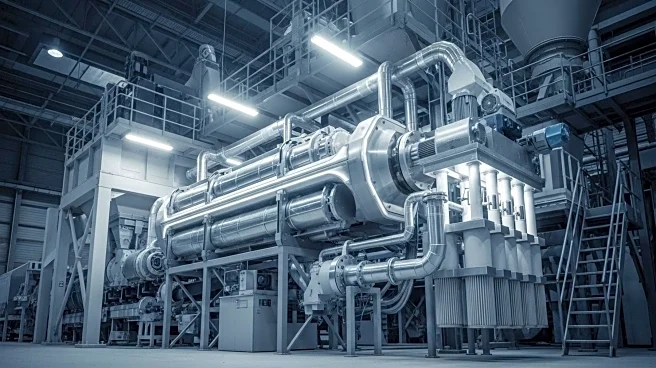What is the story about?
What's Happening?
The cement industry is taking significant steps towards decarbonization with the deployment of commercial-scale carbon-capture systems. Heidelberg Materials has launched the world's first carbon-capture plant at a cement works in Norway, with zero-carbon cement products set to be delivered to the UK and Europe. A similar installation is planned for the Padeswood cement plant in Wales, supported by a subsidy deal with the UK government. These developments aim to address the cement sector's substantial carbon emissions, which account for 8% of global emissions. The technology captures CO2 from the chemical process of making clinker, the main ingredient in Portland cement.
Why It's Important?
The deployment of carbon-capture technology in the cement industry is crucial for achieving global climate goals, as cement production is a major source of carbon emissions. By capturing and storing CO2, the industry can significantly reduce its environmental impact and move towards net-zero emissions. This initiative not only supports the transition to sustainable construction practices but also sets a precedent for other hard-to-abate sectors. The financial backing from governments is essential for the commercial viability of these projects, highlighting the importance of public-private partnerships in addressing climate change.
What's Next?
Construction of the carbon-capture installation at the Padeswood plant is set to begin soon, with the UK government subsidizing operating costs. The plant aims to capture 95% of its emissions by 2029, equivalent to 800,000 tonnes of CO2 annually. Heidelberg Materials is also exploring oxyfuel technology to enhance efficiency. As costs potentially decrease with technological advancements, the cement industry could see wider adoption of carbon-capture systems. The success of these projects may encourage other countries to implement similar initiatives, driving global efforts towards industrial decarbonization.
Beyond the Headlines
The integration of carbon-capture technology in cement production represents a transformative shift in industrial practices, with potential long-term benefits for environmental sustainability. This approach not only reduces emissions but also promotes innovation in construction materials, paving the way for eco-friendly building solutions. The ethical considerations include balancing economic growth with environmental responsibility, ensuring that technological advancements benefit both industry and society. The success of these projects could influence policy decisions and encourage investment in green technologies across various sectors.

















